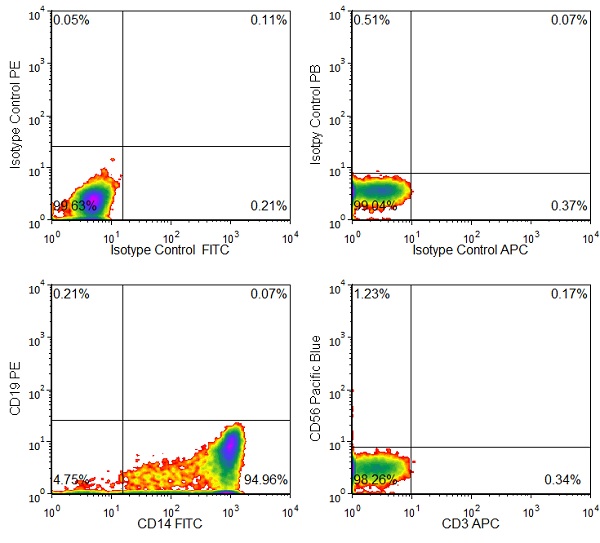Human Monocytes for Immunology and Inflammation Research
Monocyte is part of the innate immune response and functions to regulate cellular homeostasis, especially in the setting of infection and inflammation.[1] They account for approximately 5-10% of circulating nucleated cells in normal adult blood. Monocytes are the largest white blood cell, measuring between 12 to 20 µm in diameter.[2] This family of cells can be further divided into three major populations: classical (CD14hi, CD16-), representing 85-90% of monocytes, non-classical (CD14dim, CD16+) and intermediate (CD14hi, CD16+). Each subset of the monocyte family has a different role in the immune response against pathogens, inflammation. as well as various human chronic diseases, such as obesity, atherosclerosis, chronic obstructive pulmonary disease, lung fibrosis, lung cancer, and Alzheimer’s disease [3}
Peripheral Blood Monocytes
Human monocytes can be isolated from anticoagulated blood or leukapheresis material using both positive selection (e.g., using anti-CD14 antibody) or negative selection methods using lineage-specific antibodies to remove “contaminating” cells (e.g., B cells, T cells and NK cells). The latter is preferred by many researchers as it allows for the isolation of “untouched” monocytes that have not been subjected to antibody binding.
Applications of monocytes as a research tool include:
- in vitro differentiation into dendritic cells (DCs) and macrophages
- use of monocytes/DCs as antigen-presenting cells (APCs)
- assays that measure effect of test agents in monocyte activation
- monocyte chemotaxis assay
- pyrogen testing with monocyte activation test (MAT)
Monocytes from Ignyte Bio
Ignyte Bio offers cryopreserved human monocytes as a “thaw and use” tool for your research. Our monocyte products have the following characteristics to support your assay:
- High viability (>85%)
- High purity (>85% CD14+, CD3-, Cd19- and CD56-; Figure 1)
- Negative selection isolation of monocyte family without depletion of CD16+ cells
- Can be differentiated in vitro into dendritic cells and macrophages
- Available in large lots for your complex experiments.
- Effector population isolated from the same (autologous) donor, e.g., PBMC, Pan CD3 T cells, CD4 or CD8 T cells, are often available for your studies
- A comprehensive donor profile which includes:
- HLA-typing data
- FcgRIIa131 and FcgRIIIa158 genotype
Figure 1. Phenotype of Cryopreserved Human Monocytes. Cryopreserved human monocytes were thawed and incubated with anti-human CD14 FITC, anti-human CD19 PE, anti-human CD56 PB, and anti-human CD3 APC, or with isotype controls. Samples were analyzed in the Beckman CyAn flow cytometer.

